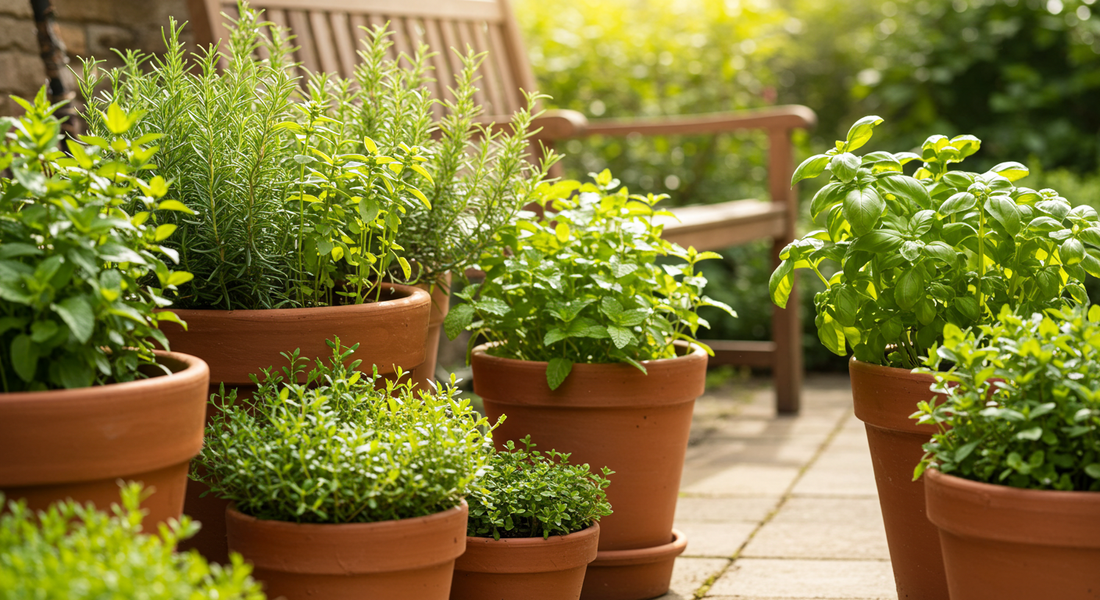
How to Start a Thriving Herb Garden: A Guide for Cooks and Gardeners
Share

There is a simple, profound joy in stepping out your door to snip a few fresh herbs for your evening meal. The burst of flavor and aroma from homegrown herbs is worlds away from the dried, dusty versions in a jar. A thriving herb garden puts fresh flavor at your fingertips, and the best part is, you don't need a green thumb to get started. Herbs are the perfect gateway into the world of gardening; they are generally resilient, don't require a lot of space, and offer a huge reward for a little effort. This guide will show you how to grow herbs successfully.
Location, Location, Location
The most important factor for a successful herb garden for beginners is sunlight.
-
Sun Requirements: Most common culinary herbs are Mediterranean natives, which means they love the sun. Choose a location that receives at least 6-8 hours of direct sunlight per day. A south-facing patio, balcony, or spot in your yard is ideal.
-
In-Ground, Raised Beds, or Containers:
-
In-Ground: If you have the space and good soil, you can plant directly in the ground.
-
Raised Beds: These offer excellent control over your soil and drainage, which herbs love.
-
Containers: This is the best option for most beginners and one of the best herbs to grow in pots. It allows you to control the soil, manage watering easily, and, most importantly, contain aggressive spreaders like mint.
-
A Beginner's "Must-Have" Herb List
Starting with a few easy-to-grow basics will build your confidence. Here are five essential herbs that are both hardy and incredibly useful in the kitchen.
-
Basil: The king of summer herbs. It loves heat and sun. Pinch off the flower heads as they appear to encourage the plant to put its energy into producing more leaves.
-
Mint: Delicious but aggressive. Rule #1 of growing mint is to always plant it in a container by itself. Its runners will quickly take over an entire garden bed if you let them.
-
Parsley: A versatile staple. It prefers consistent moisture and can tolerate a little less sun than other herbs. Harvest the outer stems first to encourage new growth from the center.
-
Rosemary: A hardy, woody herb that loves sun and well-draining, sandy soil. It is very drought-tolerant once established and hates to have "wet feet," so be careful not to overwater.
-
Thyme: Another sun-loving, drought-tolerant herb. It's a low-growing plant that is perfect for the edge of a pot or raised bed. The more you trim it, the more it will grow.
Planting and Care
Herbs are generally low-maintenance, but a few key practices will ensure they thrive.
-
Well-Draining Soil is a Must: Most herbs are susceptible to root rot if they sit in waterlogged soil. If you're using pots, make sure they have drainage holes and use a high-quality potting mix amended with perlite to improve drainage.
-
Harvest Correctly: Don't just pick off a few leaves. The best way to harvest most herbs is to give them a "haircut." Regularly trim the top third of the stems, right above a set of leaves. This encourages the plant to become bushier and produce more abundant growth.
-
Watering and Pest Control: Water your herbs when the top inch of soil feels dry to the touch. Most common pests, like aphids, can be dealt with by a strong spray of water from the hose or a simple, organic insecticidal soap.
Bringing Your Herbs Indoors for Winter
One of the great joys of container gardening is the ability to extend your harvest.
-
How to Transition: Before the first frost, bring your potted herbs inside. Give them a good check for any pests before you do. If you want to bring in plants from an in-ground garden, carefully dig them up and repot them.
-
Care for an Indoor Herb Garden: Your herbs will need as much light as you can possibly give them. A south-facing window is best. Growth will slow down indoors, and you'll need to water less frequently. Be careful not to overwater, as this is the most common cause of death for indoor herbs.
Conclusion: Elevating Your Cooking All Year Long
Starting an herb garden is a simple, rewarding project that will pay you back with incredible flavor. The connection you get from growing your own food is a bonus. By starting with a few easy plants and learning their basic needs, you can elevate your cooking with fresh, vibrant flavor all year long.
